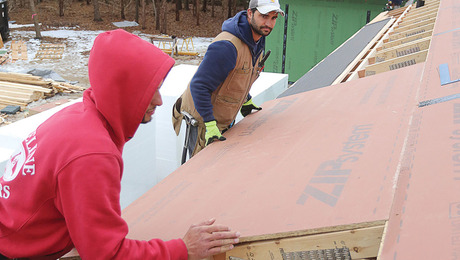I have a log cabin that I am trying to get Water run to the cabin (3/4″ PEX) and will be using a pump/macerator toilet (1″ PEX, black water). We placed 4″ PVC conduit underground in preparation for later snaking of PEX tubing within the conduit. Now is the time for the PEX tubing. Unfortunately, I found out the PVC Conduit was placed only 18-20 inches underground at its shallowest depth, at least half the distance is likely 36″ deep. I live in Ohio (frost line is 32″). It commonly, every winter, gets to freezing temperatures but hardly ever below zero degrees.
My question is the best way to insulate this PEX tubing without digging up the Conduit and still being able to snake the tube through the PVC conduit. Through my research, it seems the best options would be:
1. Heat tape wrapped around the PEX
2. Self Regulating Heat cables wrapped around the PEX
Opinions on this?
The other question I have is there a product of insulation that could be blown into the PVC pipe after the PEX is snaked through the conduit and still provide appropriate insulation to prevent freezing?
Does letting a very small drip constantly going through the winter actually work?
Any opinions from the experts with way more experience than I have would be much appreciated.
Thanks in Advance!
Bones13















Replies
PEX is pretty forgiving of being frozen because it's flexible. Which isn't to say that's a desirable situation. The drip might or might not move enough water to keep the pipe from freezing, but what it does do is help prevent bursting. Pipes freeze from the outside in, with the ice forming a series of concentric rings. This isn't where the pipe would burst though. What happens is that when the ice finally closes off the center, it begins growing in length. Water is essentially incompressable, and the hydraulic pressure builds quickly, eventually rupturing the weakest point in the pipe. If you leave a faucet dripping, you provide a safety relief valve of sorts.
As to the heat tape, I'd ask the PEX manufacturer.
I logged in to specifically refute Andy Engle's nonsense that the pipe eventually bursts from hydraulic pressure. Completely false. City static water pressure is at maximum, about 80 psi and the piping (tubing) is easily able to handle this pressure. (If I didn't feel lazy this morning I'd calculate the stress on the copper tubing walls and compare it to the yield stress of the copper.)
When the taps are shut the water pressure is about 80 psi (static water pressure) and the copper tube easily handles this pressure. It will even handle the "water hammer" that far exceeds this pressure when, for example, a solenoid valve closes suddenly in the dishwasher or washing machine causing a "slug of water" to come to sudden stop.
The pipe bursts for the simple reason that water expands when it freezes and I believe it is the only fluid to do so.
A little education here. When a fluid flows it actually has less pressure. The total energy of the water, excluding heat energy, is known as the "head" of water. It is made up of three components. The velocity, the pressure and the height above say, the ground. When the water flows the pressure component converts to the velocity component of that energy.
When a tap is opened the water the pressure drops from that 80 psi to 14.7 psi and the velocity increases from zero to whatever the head will deliver. This equation in known as the Bernoulli equation. I've ignored losses in the run of pipe but you get the idea.
Andy Engle. Don't write about stuff you know nothing about. Go to school and get an education.
signed: retired P.Eng. (mech)
But the pipe still bursts, right? Do you think the OP really cares why? Do you think anyone cares why?
There's an old saying. "Better to remain silent and be thought a fool than to speak and remove all doubt."
You Sir, have just proven the statement.
I'm sorry to have cast pearls before swine.
Suburbanguy, I did in fact say that say that expanding ice was the cause. Now, it could be that I'm wrong, but I don't think so. Here are some sources that agree with me. https://www.livescience.com/43408-why-do-freezing-pipes-burst.html
https://home.howstuffworks.com/home-improvement/plumbing/what-causes-pipes-to-burst-when-they-freeze-1.htm
https://www.iccsafe.org/cs/PMG/Documents/DIS-FreezeBurstPipe.pdf
Sources that agree with what I said.
https://www.iccsafe.org/cs/PMG/Documents/DIS-FreezeBurstPipe.pdf
https://www.livescience.com/43408-why-do-freezing-pipes-burst.html
https://home.howstuffworks.com/home-improvement/plumbing/what-causes-pipes-to-burst-when-they-freeze-1.htm
Suburbanguy, if you disagree with someone, fine, but please be civil when you respond.
The first quote is often incorrectly attributed in newspapers to Abraham Lincoln and Mark Twain--without criticism of these gentlemen. It does however have biblical roots in Proverbs 17:28 "Even a fool is thought wise if he keeps silent, and discerning if he holds his tongue."
The second quote is taken directly from Jesus' "Sermon on the Mount". Matt 7:6
Please explain to me again how I am being uncivil.
I attempted to educate Andy Engle and other readers a little about hydraulics and the Bernoulli equation and no one, florida specifically and you also, the original poster of the question no less, had no interest in expanding your knowledge.
Why do you ask questions in such a forum if you don't want to learn? I can see that my Biblical quotes apply to you too.
Speak to a foaming company. Perhaps a long plastic tubing could be fished at the same time as the PEX. The one end gets hooked up to the foaming equipment and the tube is gradually withdrawn from the conduit as the foam is applied. Be sure to complete the hook-up of the PEX before foaming so that it is filled with water and will lie on the bottom of the conduit. Some foams exert so much pressure that they will burst enclosed spaces, so be sure to spec the foam to be used. I believe some release a lot of heat. Better check that out too.
..my two cents.
We prefer never to rely on heat tape; too many variables for failure. Power outages, creature nibbling, accessibility for maintenance, compatibility with pex, safety, etc. Dripping faucets invite another set of unintended consequences that can be catastrophic. Insulation does not supply any source of heat and can give one a false sense of security. Keep it simple for maximum effectiveness. Add soil to maintain a 36" depth , or start over and trench and direct bury at the correct depth; we like to tie wrap a tracer wire to buried plastic piping.
user-1116010 I applaud you for thinking "outside the box". "Add soil to maintain a 36" depth." I hope it will work for Bones13.
Suburbanguy, who likes to criticize without using his real name, the fact is that I didn't come up with my description all on my own. That was told to me by an engineer at a PEX manufacturer probably 20 years ago when I was researching the first article ever published in Fine Homebuilding about PEX, attached. Thinking that perhaps my memory was paying tricks on me, I looked for confirming sources. I found several, but I'm including a pdf published by what I consider a reliable source, the International Code Council.
Andy,
I read your article when it was published; it is well researched, well written, and factually accurate. Your article helped convince me to switch to pex.
We've used pex with great success on typical main & branch piping installations, and with manifold systems. Each has it's merits depending on jobsite conditions.
I would caution diyers on two potential issues. Pex may not be the correct solution for low ph water ( typically 6.8 & below on the scale ) where copper tube develops pin holes, and, closed hydronic heating systems with ferrous components require cross linked O2 barrier pex for system piping.
Where pex is used to distribute potable low ph water, it will deliver fully potent water to the eventual brass alloy faucet, valve, fitting, or fixture where it can do damage. Copper pipe in this scenario becomes sacrificial, and often the water loses some if its potency after attacking the copper in the basement and isn't as likely to damage fittings, faucets, hidden metal piping, etc. downstream.
Andy,
I think what got Suburban Guy was using the word 'hydraulic' to refer to the pressure exerted by freezing and expanding water. It's not hydraulic as the term is defined, but I don't know any term that refers specifically to the pressure from ice. Here in New England there are stories of old timers splitting rock by drilling holes in a line and keeping them filled with water as winter passed. It would conceivably work as well as the 'feathers and wedges' traditionally used.
Great article on Pex.
I'm not sure what else to call pressure that's exerted by a fluid, but if there's another word for it I'd like to know.
That's kind of a nitty-gritty thing to trigger someone. Anyway, a couple of decades in this business has caused me to realize that criticism expressed with such vitriol says a lot more about the other guy than it does about me.
I'm guessing that you're probably not going to have a problem. I've run waterlines at shallower depths in colder places. There's always a chance for some catastrophic run of deep cold, but climate change is on your side there.
If water freezes in a pipe underground it's unlikely to damage the pipe because the ground freezes first, preventing any pipe from expanding unless there is a void. But you'll be in a 4'' pipe, so that advantage is removed, but replaced by the airspace as a buffer. If you keep access to the 4' pipe on both ends you could blow hot air through in the very worst scenario. If you use this water line regularly you will know if freezing is starting by a noticeable drop in pressure.
Another approach if you know the path of the underground pipe is to bury some XPS insulation above it, say 6 inches below the surface, about 2 feet wide. You didn't say how long this run is, but obviously the shorter the better.
You can also count on sod and leaves as insulation. The ground rarely freezes half as deep in forests where leaves are evenly piled. In fact, I've never found frost more than a foot deep in a forest in zone 5 (frost depth 4 feet).
Great advice everyone! Thank you for weighing in. I have to say... I am amused at the banter.
Bones, the above was banter.
In the old forum of the late 90’s and well into the 2000’s.........
That sometimes got serious and quickly turned to a “scuffle”.
Anything is easy in this cyber world. Real life? Bar room brawl.